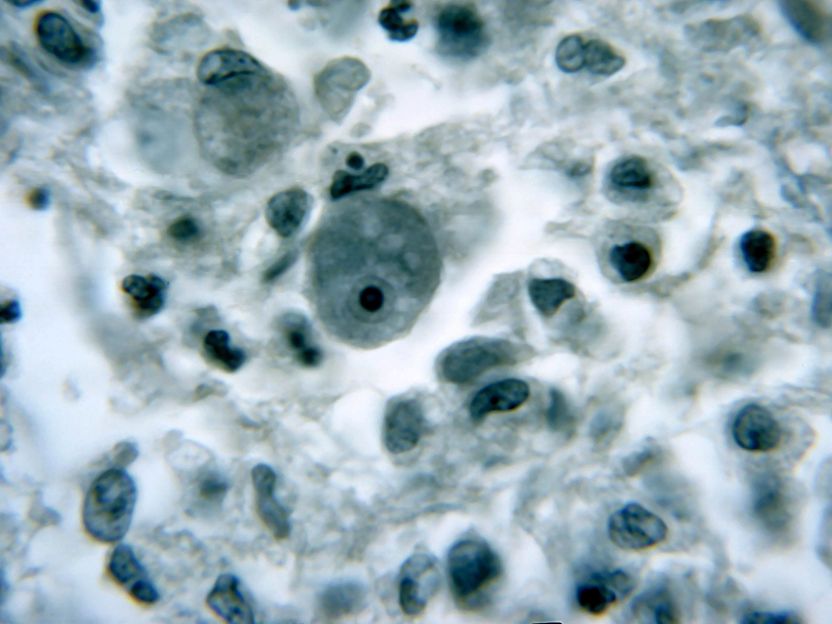Brain-eating amoebae halted by silver nanoparticles
Halloween is just around the corner, and some people will celebrate by watching scary movies about brain-eating zombies. But even more frightening are real-life parasites that feed on the human brain, and they can be harder to kill than their horror-movie counterparts. Now, researchers have developed silver nanoparticles coated with anti-seizure drugs that can kill brain-eating amoebae while sparing human cells.

Brain cells
Dr. Martin D. Hicklin, USCDCP
Although infections with brain-eating amoebae (Naegleria fowleri) are rare, they are almost always deadly. Most cases result from inhaling warm, dirty water in ponds, hot springs or unchlorinated swimming pools. Another species, Acanthamoeba castellanii, can cause blindness by entering the eyes through dirty contact lenses. Common treatments include antimicrobial drugs, but they often cause severe side effects because of the high doses required for them to enter the brain. Ayaz Anwar and colleagues wondered if three anti-seizure drugs -- diazepam, phenobarbitone and phenytoin -- could kill amoebae, alone or in combination with silver nanoparticles. The drugs are already approved by the U.S. Food and Drug Administration and are known to cross the blood-brain barrier. The researchers reasoned that they might be more effective when attached to silver nanoparticles, which can improve the delivery of some drugs and also have their own antimicrobial effects.
The team chemically attached the drugs to silver nanoparticles and examined their ability to kill amoebae. They found that each of the three drugs alone could kill N. fowleri and A. castellanii, but they worked much better when bound to silver nanoparticles. The drug-nanoparticle combos protected human cells from the microbes, increasing their survival rate compared with untreated infected human cells. The researchers propose that these repurposed drugs, aided by the nanoparticles, might kill amoebae by binding to protein receptors or ion channels on the single-celled organism's membrane.
Original publication
Most read news
Original publication
Ayaz Anwar, Kavitha Rajendran, Ruqaiyyah Siddiqui, Muhammad Raza Shah, and Naveed Ahmed Khan; "Clinically-approved drugs against CNS diseases as potential therapeutic agents to target brain-eating amoebae"; ACS Chem. Neurosci.; 2018
Topics
Organizations
Other news from the department science
These products might interest you

Eclipse by Wyatt Technology
FFF-MALS system for separation and characterization of macromolecules and nanoparticles
The latest and most innovative FFF system designed for highest usability, robustness and data quality

DynaPro Plate Reader III by Wyatt Technology
Screening of biopharmaceuticals and proteins with high-throughput dynamic light scattering (DLS)
Efficiently characterize your sample quality and stability from lead discovery to quality control

Get the life science industry in your inbox
By submitting this form you agree that LUMITOS AG will send you the newsletter(s) selected above by email. Your data will not be passed on to third parties. Your data will be stored and processed in accordance with our data protection regulations. LUMITOS may contact you by email for the purpose of advertising or market and opinion surveys. You can revoke your consent at any time without giving reasons to LUMITOS AG, Ernst-Augustin-Str. 2, 12489 Berlin, Germany or by e-mail at revoke@lumitos.com with effect for the future. In addition, each email contains a link to unsubscribe from the corresponding newsletter.
Most read news
More news from our other portals
Last viewed contents

Revealing the secrets of cell competition - Which features distinguish “winner” from “loser” cells

Million Euro Boost for Neuro Start-up to Address Mental Health Disorders with Flickering Light
Category:Hemorrhagic_fevers
Fraunhofer-Institut für Zuverlässigkeit und Mikrointegration (IZM) - Berlin, Germany
Feline_viral_rhinotracheitis





















































